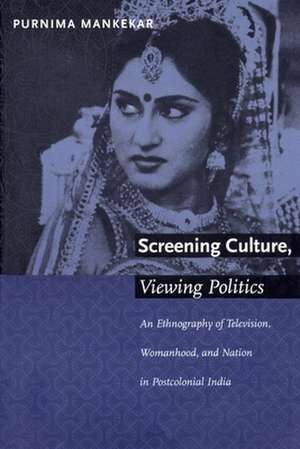Screening Culture, Viewing Politics – An Ethnography of Television, Womanhood, and Nation in Postcolonial India
Autor Purnima Mankekaren Limba Engleză Paperback – 9 dec 1999
Preț: 310.83 lei
Nou
Puncte Express: 466
Preț estimativ în valută:
59.48€ • 62.02$ • 49.44£
59.48€ • 62.02$ • 49.44£
Carte tipărită la comandă
Livrare economică 21 martie-04 aprilie
Preluare comenzi: 021 569.72.76
Specificații
ISBN-13: 9780822323907
ISBN-10: 0822323907
Pagini: 448
Dimensiuni: 159 x 236 x 33 mm
Greutate: 0.73 kg
Ediția:New.
Editura: MD – Duke University Press
Locul publicării:United States
ISBN-10: 0822323907
Pagini: 448
Dimensiuni: 159 x 236 x 33 mm
Greutate: 0.73 kg
Ediția:New.
Editura: MD – Duke University Press
Locul publicării:United States
Notă biografică
Recenzii
"Purnima Mankekar has crafted a compelling and richly informed account of one of the most difficult of anthropological topics: the power of television to turn local and gendered intimacies into - literally - gripping allegories of national identity. Fusing scholarship and elegance in an exceptionally accessible narrative, she attends to audiences as well as texts. In this way, she provides an exemplary demonstration of how superb ethnography can best disentangle the actual complexities behind the usual cant about modernity, nationalism, and the media." -- Michael Herzfeld, author of Portrait of a Greek Imagination "An outstanding work by a brilliant and passionate scholar. Screening Culture, Viewing Politics is a rare jewel. Not only does Mankekar explore a key historical moment in India's history, but she brings a vibrant feminist political critique to her understanding of the construction of the modern Indian state. This book will become a classic." -- Ann Gray, University of Birmingham "A thorough, lucid and well-crafted book, Screening Culture, Viewing Politics is essential reading for any student of modern India concerned with television, gender and politics. It is a foundational text in the emerging study of consumption and the new middle classes of India."--The Times Higher, March 16, 2001 " ... invaluable contributions to the study of television in India today ... "--SCREEN, Spring 2003
Textul de pe ultima copertă
"In India, where nothing stands still, least of all, tradition, it is remarkable how the unwavering eye of Purnima Mankekar has studied the ceaseless working and reworking of the gendered anxieties of a nationalized, post-colonial, febrile middle under the flickering light of Doordharshan--India's state run television. "Screening Culture, Viewing Politics" is a must for anyone interested in culture in the broadest and most fecund sense of that term."--E. Valentine Daniel, author of "Charred Lullabies: Chapters in an Anthropography of Violence"


















